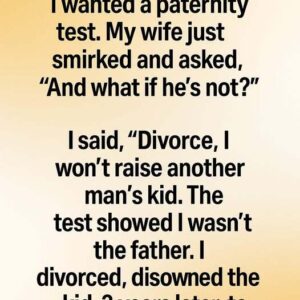When my sister died unexpectedly, the world tilted on its axis. One moment, I was helping her plan a family gathering, and the next, I was standing at her funeral, clutching her seven-year-old daughter’s trembling hand. The child’s name was Lily — a bright, gentle soul who loved drawing flowers and asking questions about everything. Her wide, uncertain eyes that day said everything words couldn’t. She had lost her mother, her world, her anchor.
After the service, as relatives exchanged tearful goodbyes and promises to stay in touch, the question no one wanted to face hung heavy in the air: Who would take Lily?
I remember looking at her small figure sitting quietly beside my husband, her hands clasped tightly around her stuffed rabbit. My heart ached in a way I’d never felt before. I wanted to protect her, to give her the safety and love she’d just lost.
That night, I turned to my husband and whispered, “What if we take her in?”
He hesitated. I could see the weight of my question land on him — the fear, the doubt, the sudden enormity of the responsibility. “It’s not that I don’t care,” he said gently, “but we’re not ready. We don’t even have the space, or the means. This would change everything.”
His words were rational, but they broke me.
I understood his hesitation, but I also felt something deeper — a pull toward that little girl who had already lost too much. I didn’t argue, though I wanted to. I told myself we’d find another way, that someone else in the family would step forward. But no one did. Within weeks, Lily was placed in foster care.
And though I tried to convince myself it was for the best — that she’d be cared for, that it was what the system was built for — guilt took root inside me like a thorn that never stopped pricking.
Years passed.
Every birthday that came and went, I thought of her. Every Christmas morning, I imagined her opening gifts somewhere far away, maybe wondering if we ever thought of her. My husband and I grew older, quieter, more reflective. Time has a way of softening some things, but not all. Some regrets simply shift shape — from sharp pain to dull ache, from daily sorrow to a heavy silence that never quite lifts.
Sometimes, at night, I’d dream of her — that same little girl, with her mother’s smile, running down a hallway that never ended, always just out of reach. I’d wake up crying, ashamed of how easily we’d let her go.
My husband rarely spoke of it, but I could tell the guilt lived in him, too. It showed in the small pauses, in the way he changed the subject when I mentioned her name. We both carried it differently — mine loud and aching, his quiet and buried.
Fourteen years later, a knock on our door changed everything.
It was a soft knock, tentative, almost uncertain. I wasn’t expecting anyone. When I opened the door, I saw a young woman standing on the porch, holding a small bag in one hand and a folded letter in the other.
Her eyes — those deep hazel eyes — stopped my breath. I knew them instantly.
“Lily?” I whispered.
She smiled shyly. “Hi, Aunt Claire.”
For a moment, I couldn’t speak. Tears blurred my vision as memories collided with reality — the laughter of a little girl, the haunting emptiness after she left, and now this, a living, breathing miracle at my doorstep.
My husband appeared behind me, his face pale, his lips parted in shock.
“I hope it’s okay that I came,” she said softly. “I’ve thought about you both for a long time.”
We invited her in. The house felt smaller that day, as though time itself had folded inward to make space for everything unsaid.
We sat in the living room — the same room where I’d once cried over her photo, where I’d whispered apologies into the quiet. Now she was here, grown and graceful, her voice calm but carrying the weight of years gone by.
“I used to wonder,” she began, “why you didn’t take me in. For a while, I thought maybe I’d done something wrong. But as I got older, I started to understand that adults have their own fears — their own limits.”
I reached for her hand, my voice breaking. “We should have fought harder. You were just a child, and you deserved better from us.”
She squeezed my hand gently. “You don’t have to apologize,” she said. “I found a wonderful foster family. They gave me love, stability, and encouragement. They told me about my mom often — kept her memory alive. And I always hoped one day I’d see you again, not to ask why, but just to know you still cared.”
My husband swallowed hard. His voice was quiet when he finally spoke. “We did. Every single day.”
There was a long silence, but it wasn’t uncomfortable. It was full — thick with emotion, understanding, and something I hadn’t felt in years: peace.
She told us about her life — how she’d gone to college for social work, inspired by the kindness she’d received. She wanted to help children who felt lost, the way she once did. Her words carried wisdom far beyond her years, but her laughter — bright and warm — still had the echo of the child I remembered.
“I guess,” she said with a soft smile, “we all ended up where we were meant to be.”
That line struck something deep inside me. Maybe it was true. Maybe the pain, the guilt, the missed chances had all led us here — to this unexpected reunion, to this chance to rebuild something that once felt broken beyond repair.
As the afternoon light faded, she reached into her bag and pulled out a photo — an old one I hadn’t seen in decades. It was of my sister, holding Lily on her lap, smiling wide. She handed it to me and said, “I wanted you to have this. Mom always said family finds its way back, one way or another.”
I couldn’t stop crying. My husband stood and quietly excused himself, only to return moments later with something from his desk — a tiny, faded drawing Lily had made the last time we saw her. It was of three stick figures holding hands under a sun, labeled Mom, Me, Auntie.
He placed it on the table, his voice breaking. “We’ve kept this all these years,” he said.
Lily’s eyes shimmered as she looked at it. “Then I guess we never really lost each other,” she whispered.
That night, after she left, the house felt different — lighter somehow. My husband and I sat in silence for a long time, the air full of everything we didn’t need to say.
Finally, he spoke. “She forgave us.”
“Yes,” I said. “But more than that — she taught us how.”
Fourteen years of guilt had lived between us and that little girl we once couldn’t save. But she, with her quiet grace, tore down the wall we’d built and replaced it with something stronger: understanding.
Forgiveness doesn’t erase the past. It doesn’t undo choices or bring back lost time. But it opens doors that guilt keeps locked — and sometimes, through those doors, love walks back in.
Lily’s visit reminded me that life has an extraordinary way of circling back. That love, even when buried under years of silence, doesn’t die — it just waits patiently for the right moment to be found again.
And when it is, it doesn’t ask for perfection or apology. It simply says, I’m here. Let’s begin again.





